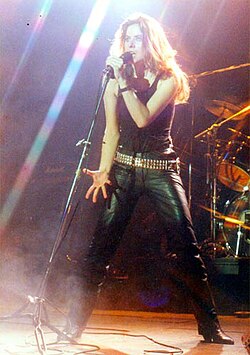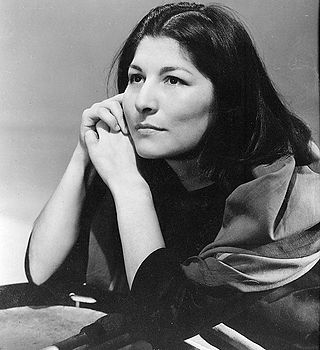
Haydée Mercedes "La Negra" Sosa was an Argentine singer who was popular throughout Latin America and many countries outside the region. With her roots in Argentine folk music, Sosa became one of the preeminent exponents of El nuevo cancionero. She gave voice to songs written by many Latin American songwriters. Her music made people hail her as the "voice of the voiceless ones". She was often called "the conscience of Latin America".
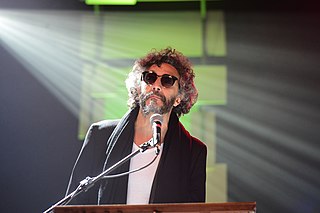
Rodolfo Páez, popularly known as Fito Páez, is an Argentine popular rock and roll musician and filmmaker.
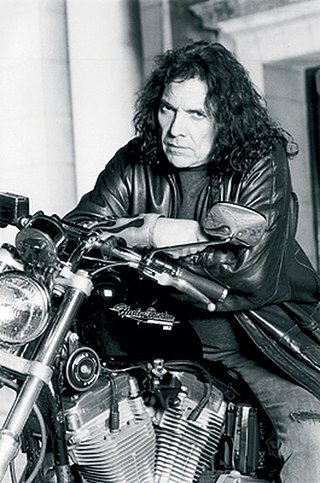
Norberto Aníbal Napolitano, popularly known as Pappo, was an Argentine rock musician, guitarist, singer and songwriter. One of the most influential figures in Argentine music, he was a forerunner of Argentine rock, heavy metal and blues.

María Cristina Lancelotti, better known by her stage name Valeria Lynch, is an Argentine singer and actress.

Andrés Calamaro is an Argentine musician, composer and Latin Grammy winner. He is considered one of the greatest and most influential rock artists in Spanish. He is also one of the most complete artists for his wide range of musical styles, including funk, reggae, ballads, boleros, tangos, jazz. His former band Los Rodríguez was a major success in Spain and throughout Latin America mainly during the 1990s. He is multi-instrumentalist and became one of the main icons of Argentine rock, selling over 1.3 million records to date.

Pedro Aznar is an Argentine musician and singer-songwriter. He has musical experience in jazz, Argentine folk and rock music and has a successful career as a solo artist. He is well known for giving rock songs a jazz-oriented style, by playing the fretless bass, with a big influence from Jaco Pastorius.
"I Am What I Am" is a song originally introduced in the Broadway musical La Cage aux Folles. The song is the finale number of the musical's first act, and performed by the character of Albin Mougeotte, first played by George Hearn. His version appears on the original cast album released in 1983. The song was composed by Jerry Herman.
Fabián Andrés González Amado, known by his stage name Tweety González, is an Argentine musician and record producer. González is mostly known for being the touring keyboardist for Argentine rock band Soda Stereo and Argentine musician Fito Páez. Tweety is also a music producer and has worked with artists Shakira, Gustavo Cerati, Illya Kuryaki and the Valderramas, Luis Alberto Spinetta, Superlitio, Famasloop and several others. Gustavo Cerati's 2006 Ahí vamos in which Tweety played keyboards won the Latin Grammy for Best Rock Solo Vocal Album.

Sandra Mihanovich is an Argentine singer, musician, and composer of rock, blues, and tango rhythms.

Laura Ana "Tita" Merello was an Argentine film actress, tango dancer and singer of the Golden Age of Argentine cinema. In her six decades in Argentine entertainment, at the time of her death, she had filmed over thirty movies, premiered twenty plays, had nine television appearances, completed three radio series and had had countless appearances in print media. She was one of the singers who emerged in the 1920s along with Azucena Maizani, Libertad Lamarque, Ada Falcón, and Rosita Quiroga, who created the female voices of tango. She was primarily remembered for the songs "Se dice de mí" and "La milonga y yo".

"Une femme avec une femme" is a 1990 song by Spanish pop band Mecano. In late 1990, it was released as a single from the band's seventh album, released in 1988, Descanso dominical, on which it appears as the third track. It became a hit in France, hitting number one for seven weeks. Also in 1990, the song was notably covered by the pop duo formed by Argentine singers Sandra Mihanovich and Celeste Carballo as the title track of their studio album Mujer contra mujer, which is regarded as a landmark by the country's lesbian community. In 2003, the song was covered by Saya, becoming a top-10 hit in France.

Marta Sánchez López is a Spanish singer. She has sold more than 10 million albums.
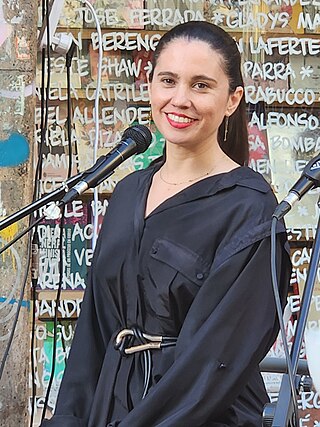
Javiera Alejandra Mena Carrasco is a Chilean singer, songwriter, musician, and record producer based in Madrid, Spain. She started her musical career in the Chilean indie music scene in 2001 and achieved wider success after the release of her debut studio album Esquemas Juveniles (2006). Her musical style tends to be synthesized electronic sound, although in her career beginnings she made acoustic-oriented songs, accompanied solely by guitar.

Teresa Adelina Sellarés, best known as Teresa Parodi, is an Argentine singer and songwriter. She held the inaugural post of Minister of Culture of Argentina from May 6, 2014, to December 9, 2015. She was a deputy to the Mercosur Parliament (Parlasur) representing the nationwide district of Argentina from December 10, 2015, to October 6, 2016. She was elected on the Front for Victory ticket in the 2015 election.

Malena Muyala is a Uruguayan singer-songwriter who specializes in tango and milonga music. She has released several albums that were certified gold and platinum, and has toured within and outside Uruguay.

Ricardo Jorge Mollo is an Argentine musician, producer, singer and composer. Mollo is best known as the guitarist for Sumo from 1984 until the band's dissolution after Luca Prodan's death in 1987 and, shortly thereafter, a co-founder of Divididos. His work and guitar skills has been considered highly influential in the development of Argentinian rock during the 1970s and 1980s.
LGBT in Argentina refers to the diversity of practices, militancies and cultural assessments on sexual diversity that were historically deployed in the territory that is currently the Argentine Republic. It is particularly difficult to find information on the incidence of homosexuality in societies from Hispanic America as a result of the anti-homosexual taboo derived from Christian morality, so most of the historical sources of its existence are found in acts of repression and punishment. One of the main conflicts encountered by LGBT history researchers is the use of modern concepts that were non-existent to people from the past, such as "homosexual", "transgender" and "travesti", falling into an anachronism. Non-heterosexuality was historically characterized as a public enemy: when power was exercised by the Catholic Church, it was regarded as a sin; during the late 19th and early 20th centuries, when it was in the hands of positivist thought, it was viewed as a disease; and later, with the advent of civil society, it became a crime.
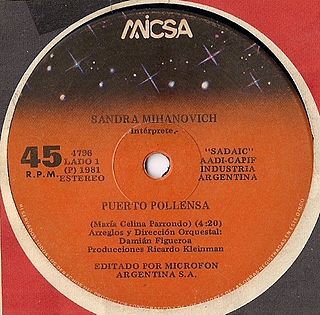
"Puerto Pollensa" is a song written by Argentine singer-songwriter and actress Marilina Ross, first recorded and popularized by singer Sandra Mihanovich, who released it as a single in 1981 and later included it in her album of the same name, released in June 1982 on MICSA, a subsidiary of label Microfón. The lyrics of the song are autobiographical and tell a love affair that Marilina Ross had on the beaches of Puerto Pollensa, a town north of Mallorca in the Balearic Islands.

Andrea Álvarez is an Argentine musician. She was part of Rouge, the first all female Argentine rock band, and accompanied many nationally and internationally renowned artists.

Mujer contra mujer is the second and final studio album by the pop duo formed by Argentine singers Sandra Mihanovich and Celeste Carballo, released by RCA Records and Sony BMG in October 1990. Mihanovich and Carballo had already developed successful solo careers before joining as a duo. After collaborating on a successful show in the summer of 1987, they decided to record together and released their first studio album as a duo, Somos mucho más que dos, in 1988. Around this time, Mihanovich and Carballo became romantically involved, although not publicly. Their songs included subtle references to lesbian love, and the nature of their relationship caused much speculation in the media. Before forming the duo, Mihanovich already had two popular gay anthems in her repertoire: her 1981 breakthrough single "Puerto Pollensa", and "Soy lo que soy", her 1984 Spanish-language cover of "I Am What I Am".
